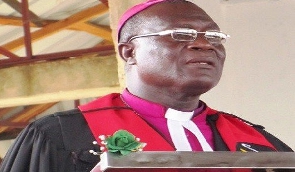 Stephen Bosomtwe Ayensu, former Methodist Bishop of Obuasi Diocese
Stephen Bosomtwe Ayensu, former Methodist Bishop of Obuasi Diocese
A Former Methodist Bishop of Obuasi Diocese has voiced his displeasure about the High Court’s decision that Achimota School should admit two Rastafarian students Tyrone Marhguy and Oheneba Nkrabea.
According to Stephen Bosomtwe, the presiding judge’s ruling on the case was rather unfortunate and must be rescinded.
He cited that the ruling set a bad precedent and likened it to making galamsey and prostitution legal.
Bishop Bosomtwe in an interview on Rainbow Radio stated that “If that was the ruling, then galamsey operators should operate. Don’t they have the rights? It is their fundamental right to eat. What is the fundamental right of traders selling on our roads?” he quizzed.
He continued, “If the government directs them to stop, is it not their right to eat? Excuse me to say, can we also say it is the fundamental right of prostitutes to eat and so they should operate? So why don’t we allow them to prostitute so they can eat? I am disappointed in the ruling of the court. The judge must reverse her order. It is not proper and should not be encouraged. She must go back and come back with her ruling.”
Meanwhile, the Board of Governors of the Achimota have announced its decision to appeal the High Court’s decision.
In a statement issued on June 1, 2021, the board of the school said they have instructed the school’s lawyers to appeal the court’s decision as they disagree with the ruling.
The saga began when the Achimota School refused admission to Tyrone Iras Marhguy and Oheneba Kwaku Nkraba over their hairstyles after they both passed their basic school exams and were placed in the school by the Ghana Education Service.
The family of two subsequently sued the school for discrimination and asked the court to compel the school to admit them, citing religion and belief as the basis for the dreadlocks.
On Monday, May 31, 2021, the Human Rights Division of the High Court, presided by Justice Gifty Agyei ordered Achimota School to admit the two students.
Justice Gifty Agyei Addo giving her ruling pointed that the fundamental human rights of the two students cannot be limited by the rules of Achimota School.